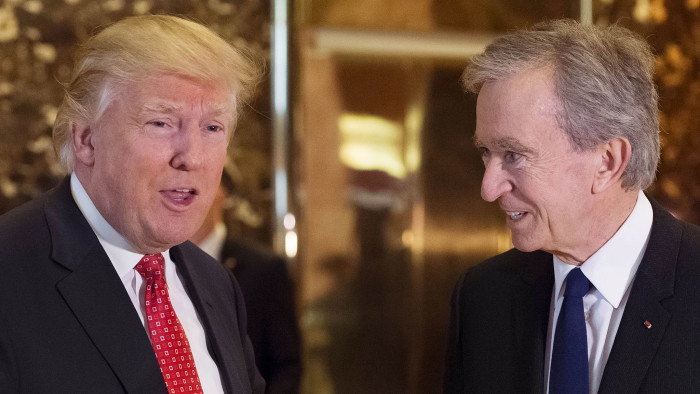Watchmakers hope for Trump economics rally

Simply sign up to the US trade myFT Digest -- delivered directly to your inbox.
A watch ticks, a fanfare swells, a shrill alarm sounds and a deep voice intones, “Good morning, Mr President.” In this television ad, Swiss watchmaker Vulcain airs pride in its presidential history — Harry Truman, Dwight Eisenhower and Lyndon Johnson were all fans of Vulcain and every successive president except George W Bush has owned one.
It remains to be seen, however, whether Donald Trump, the incoming US president, will help the watchmaking industry or worsen the problems Swiss manufacturers have experienced since 2014. Exports, according to the Swiss watch industry federation, are down 10.3 per cent in the two years to November 2016 and by 28 per cent in Hong Kong and 22 per cent in the US, the two biggest markets.
Executives from the luxury industry are already talking to Mr Trump. Bernard Arnault, chief executive of LVMH, which owns watch brands like Hublot and TAG Heuer, met him on January 9 and said LVMH, which derives 9.2 per cent of its revenues from watches and jewellery, might consider expanding its operations in the US.
Policies Mr Trump mentioned on the campaign trail have broad relevance to the watch industry. If his administration were to push through the income tax rate cuts promised, that could boost the spending power of wealthy Americans when the dollar is already at near 14-year highs. Indeed, the DXY dollar index, a measure against a basket of peers, began its upturn in mid-2014 and has risen nearly 27 per cent since, including more than four percentage points following Mr Trump’s election victory.
There has been a sustained Trump-driven stock market rally. The Dow Jones Industrial Average has advanced more than 8 per cent since the election and continues to push on. This, together with the economic growth that Mr Trump has promised, could boost the luxury market in general and watches in particular.
“Trump certainly has a pro-business stance and bringing back jobs to the US and growing the economy is very much part of his mantra,” says Giles English, co-founder of UK-based watchmaker Bremont. “That sort of talk undoubtedly boosts confidence and people are more inclined to spend when they feel confident about the future.”
Rogerio Fujimori, an analyst at RBC Capital Markets, says the US offers long-term growth for the industry, considering “the mismatch between the big US wealth pool (which contains 35 per cent of the world’s population classified as of high net worth) and limited penetration of Swiss watches (relative to other luxury categories)”.
In keeping with his “America First” trade policy, however, Mr Trump has nominated Robert Lighthizer, an advocate of protectionism, as his US trade representative. While his policies will have more bearing on relations with China, they could ensnare Switzerland’s watch industry.
“The industry’s fortunes are linked to growth in the number of wealthy and middle-class people globally, says Jelena Sokolova, an analyst at investment research business Morningstar. “If Trump’s protectionist policies have [an] adverse impact on Chinese growth and wealth creation, it could impact the industry negatively.” However, such conclusions remain farfetched at the moment, she adds.
Mr Trump’s protectionist policies that have so far been used to shame and strong-arm automakers and industrial companies like Carrier into keeping jobs and manufacturing plants in the US could bring further scrutiny to US watchmakers like Shinola. Last year, the company agreed that it would move away from its “Where American is made” slogan after the Federal Trade Commission said it felt the phrase was likely to mislead consumers about the extent to which its watches and other products were made in the US.
The FTC’s guidelines require companies that use “Made in America” slogans to have products that are “all or virtually all” made domestically.
Shinola made concessions, including “applying corrective hangtags and information cards . . . to alert consumers to the fact that those products include significant imported content”. But the company told the Financial Times, “Shinola is not a ‘Made in America’ play, it is a company with a sincere interest and devotion to creating American jobs in industries where manufacturing has left our shores.”
Mr Trump has promised to repeal “job-killing” regulations, a move which the watchmaking industry would in general welcome. “The American Watch Association has always stood for, promoted and supported the reduction of taxes and tariffs on watches and the elimination of burdensome regulation on watch companies and their suppliers,” says Alyson Gottlieb, a spokesperson for the association.
The dollar may have further to strengthen under Mr Trump, if the US economy continues to grow and the Federal Reserve accelerates the pace of its interest rate rises should Mr Trump’s proposed stimulus measures raise inflation. While the strong dollar benefits domestic spending, many US department stores and retailers have warned that it has cooled tourist expenditure.
That could counterbalance the pressure the industry has faced from the strong Swiss franc, however, which has driven up manufacturing costs. The franc has appreciated nearly 12 per cent against the euro since January 2015.
Recent performance by some of the best-known Swiss watchmakers shows how sombre the industry’s mood is. Richemont, the luxury conglomerate which owns brands like Vacheron Constantin and Cartier, abolished its chief executive position last year. Founder Johann Rupert emphasised the need to “slim down” as the group’s interim results showed that operating profits had fallen 43 per cent and sales were down 13 per cent.
Sales at Swatch, which owns Breguet and Omega, decreased by more than 11 per cent in the first half of the year and profits fell by more than half. Analysts estimate sales will drop nearly 5 per cent in the second half.
Additional reporting by Simon de Burton
Comments